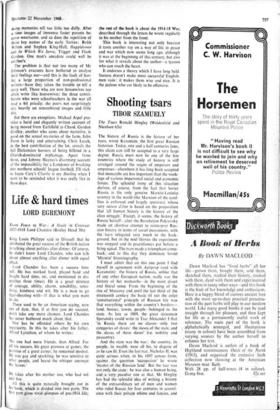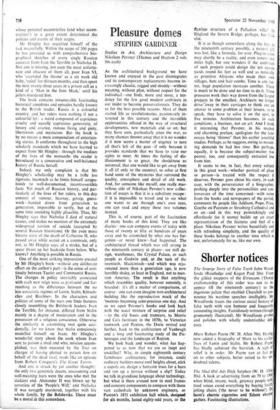Shooting tsars
TIBOR SZAMUELY
The history of Russia is the history of her tsars, wrote Karamzin, the first great Russian historian. Today, one and a half centuries later, this claim can still be accepted to a very large degree. Russia must now be one of the few countries where the study of history is still arranged around the reigns of emperors and empresses—elsewhere it has long been accepted that monarchs are less important than the work- ings of various impersonal social and economic forces. The splendid irony of this situation derives, of course, from the fact that Soviet Russia is the only genuine Marxist-Leninist country in the world (the Marxism of the satel- lites is enforced and largely spurious), whose very raison d'être is based on the proposition that 'all human history is the history of the
class struggle.' Except, it seems, the history of Russia-herself : after the Revolution Pokrovsky
made an: abortive attempt to reinterpret Rus-
sian history rin terms of social movements, with the tsars -relegated very much to the back-
ground, -but in the mid-'thirties the experiment was stopped and its practitioners put before a firing squad. The tsars made a triumphant come- back,- and- to this day they dominate Soviet `Marxist' historiography.
-I must admit that on this one point I find myself in agreement with Agitprop (and with Karamzin): the history of Russia, unlike that of any. other European nation, really was the history of her monarchs—in the most direct and literal sense. From the beginning of the rise.of .Muscovy and until the last third of the nineteenth century the basic (if not the only) 'constitutional' principle of Russian life was that everything svithin the country's borders— land, houses, towns, people—belonged to the state. As late as 1809, the great statesman Speransky could write to Tsar Alexander I that 'in Russia there are no classes—only two categories of slaves: the slaves of the state, and the _slaves of these slaves' (i.e. nobility and peasantry).
And the state was the tsar: the country, its people, its wealth, were all his, to dispose of as he saw.fit. Even the last tsar, Nicholas II, was quite serious when, in his 1897 census form, against the question 'occupation' he wrote 'mPater:Of 'the Russian land.' But the tsar was not prily te,state: he was also a human being, angle. :very. peculiar one at that. Mr Hingley has had the splendid idea of writing a history of the extraordinary set of men and women who ruled Russiafor four centuries in accord- ance with their private whims and fancies, and whose personal eccentricities (and wbat eccen- tricities!) to a great extent determined .the policies and events of their reigns. •
Mr Hingley has acquitted himself of the task masterfully. Within the scope of 300 pages he has provided us with comprehensive bio- graphical sketches of every single Russian autocrat from Ivan the Terrible to Nicholas II. Not one is missing, not even the most unfortu- nate and obscure of them all, poor Ivan VI, who 'ascended the throne' as a six week old baby, 'ruled' for thirteen months, and then spent the next twenty-three years in a prison cell as a kind of a 'Man in the Iron Mask,' until his jailers murdered him.
The book contains innumerable fascinating historical anecdotes and episodes hardly known to the British reader. Russia is a colourful country, and her rulers were nothing if not a colourful lot: a weird compound of capricious cruelty and equally capricious generosity, 'of luxury and avarice, riotous living and piety, libertinism and mysticism. But the book is by no means a mere compendium of entertain- ing stories. It conforms throughout to the high scholarly standards which we have learned to expect from Mr Hingley: through the medium of the lives of the monarchs the reader is Introduced to a consecutive and well-balanced history of Russia herself.
Indeed, my only complaint is that • Mr Hingley's scholarship may be a trifle too rigorous, inasmuch as he limits himself scrupu- lously to well-documented, incontrovertible facts. Yet much of Russian history, and par- ticularly of the lives of her rulers, to this day consists of rumour, hearsay, gossip, guess- work—handed down from generation to generation, impossible to verify, but at the same time sounding highly plausible. Thus, Mr Hingley says that Nicholas I died of natural causes, and makes no mention of the extremely widespread version of suicide (accepted by several Russian historians). Or the even more bizarre story of the death of Catherine H, who passed away while seated on a commode, only not, as Mr Hingley says, of a stroke, but of a spear thrust up her backside from below. Who knows? Anything is possible in Russia.
One of the most striking impressions created by Mr Hingley's book—without any deliberate effort on the author's part—is the sense of con- tinuity between Tsarist and Communist Russia. The changes in policy inevitably associated with each new reign were as profound and far- reaching as the differences between the no leis autocratic regimes of Lenin, Stalin, Khrush- chev and Brezhnev. In the characters and policies of some of the tsars one finds featutes closely resembling the Bolshevik leaders. Ivan the Terrible, for instance, differed from Stalin mainly in a degree of moderation and in the possession of a religious conscience. Otherwise the similarity is astonishing (not quite acci- dentally, for we know that Stalin consciously modelled himself on Ivan). Mr Hingley's wonderful story about the cook whom Ivan sent to poison a rival and who, mission accom- plished, was then executed by the Tsar on charges of having plotted to poison him on behalf of the dead rival, reads like an episode from Robert Conquest's The Great Terror.
And one is struck by yet another thought: the only two genuinely decent, unassuming and well-meaning tsars were the ones who met the Stickiest end. Alexander II was blown up by terrorists of the 'People's Will,' and Nicholas II was savagely murdered, together with his whole family, by the Bolsheviks. There Must be a moral in this somewhere.



































 Previous page
Previous page